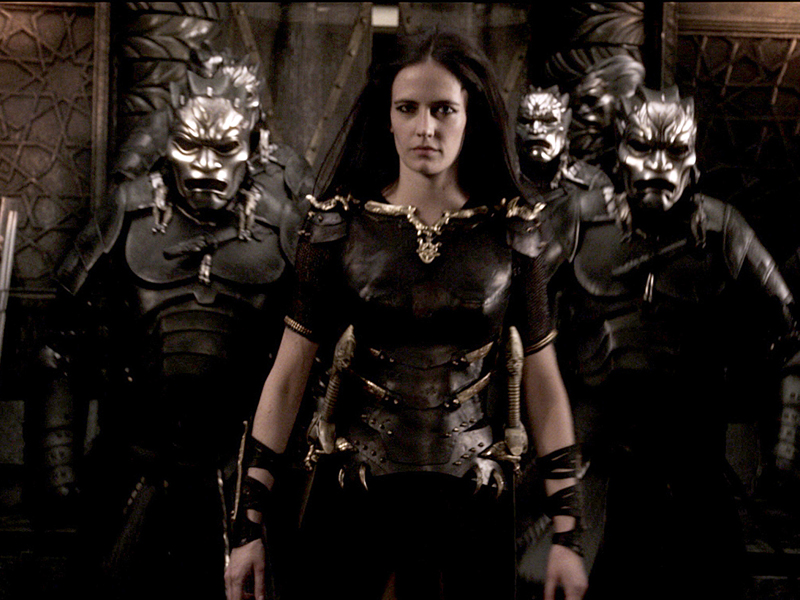

Xerxes suggests it is most likely a trap, but she still leaves after reminding him that she made him king through her efforts while he sat safely at a distance and watched. Upon learning he is alive, Artemisia leaves to ready her entire navy for battle. In Athens, Xerxes's army is laying waste when Ephialtes arrives to deliver Themistokles' message. Before departing, Themistokles returns Leonidas's sword, which had been delivered to him by Ephialtes under Xerxes's orders, and urges Gorgo to avenge Leonidas. He then visits Gorgo in Sparta while she is mourning Leonidas's death to ask for help, but Gorgo is angry for what the goal of a united Greece has cost her and her people. Themistokles spares him instead, so he can warn Xerxes that the Greek forces are gathering at Salamis. Ephialtes acknowledges and regrets his betrayal shamefully, and welcomes death. The deformed Spartan traitor reveals that Xerxes plans to attack and burn Athens to the ground. Themistokles returns to Athens and confronts Ephialtes. After recovering from his injuries, Themistokles learns that only a few hundred of his warriors and six of his ships survived the disastrous attack executed by Artemisia.ĭaxos, an Arcadian general, tells Themistokles that Leonidas and his 300 men were killed after Ephialtes betrayed the Greeks to Xerxes. Believing Themistokles to be dead, Artemisia and her forces withdraw.

Themistokles is thrown into the sea by an explosion and nearly drowns before being rescued by Aeskylos, and stands by Scyllias's side as he succumbs to his injuries. Artemisia and her men fire flaming arrows and torches to ignite the tar, but an Athenian manages to kill one of the Persians, who falls into the tar carrying a torch, causing ships from both sides to explode. The Persians spill tar into the sea and send suicide bombers to swim to and board the Greek ships with their flame bombs. He refuses, causing her to shove him in the middle of sex, and swear revenge on him. They fight and make love at the same time. Impressed with Themistokles' skills, Artemisia brings him onto her ship where she has sex with him, in an attempt to lure him to the Persian side as her second-in-command. The Greeks charge the Persian ships from the cliffs above and kill more Persians. The following day, the Greeks feign a retreat and lead a group of Persian ships into a crevice, where they become stuck. They ram their ships into the Persian ships, charge them, slaughtering several soldiers before retreating from the sinking Persian ships.

Themistokles leads his fleet of fifty warships and several thousand men, which include Scyllias, Scyllias's son Calisto, and Themistokles' right-hand man Aeskylos to the Aegean Sea, starting the Battle of Artemisium. Themistokles also learns that Leonidas has marched to fight the Persians with only 300 men. Her lust for vengeance gained the attention of King Darius and he made her a naval commander after she killed many of his enemies. She was rescued and adopted by a Persian emissary. Themistokles later reunites with his old friend Scyllias, who infiltrated the Persian troops and learned Artemisia was born Greek, but defected to Persia as her family was raped and murdered by Greek hoplites and she was taken as a sex slave, and subsequently left for dead in the streets. Themistokles then travels to Sparta to ask King Leonidas for help, but is informed by Dilios that Leonidas is consulting the Oracle, and Gorgo is reluctant to side with Athens. He returns to Persia and declares war on Greece to avenge his father.Īs Xerxes's forces advance towards Thermopylae, Themistokles meets with the council and convinces them to provide him with a fleet to engage the Persians at the sea. Xerxes finally reaches a cave and bathes in an otherworldly liquid, emerging as the 8-foot tall "God-King". Darius's naval commander, Artemisia, claims that Darius' last words were in fact a challenge and sends Xerxes on a journey through the desert. Darius's son, Xerxes, witnesses his father's death, and is advised to not continue the war, since "only the gods can defeat the Greeks". Queen Gorgo of Sparta tells her men about the Battle of Marathon, in which King Darius of Persia was killed by General Themistokles of Athens ten years earlier.


 0 kommentar(er)
0 kommentar(er)
